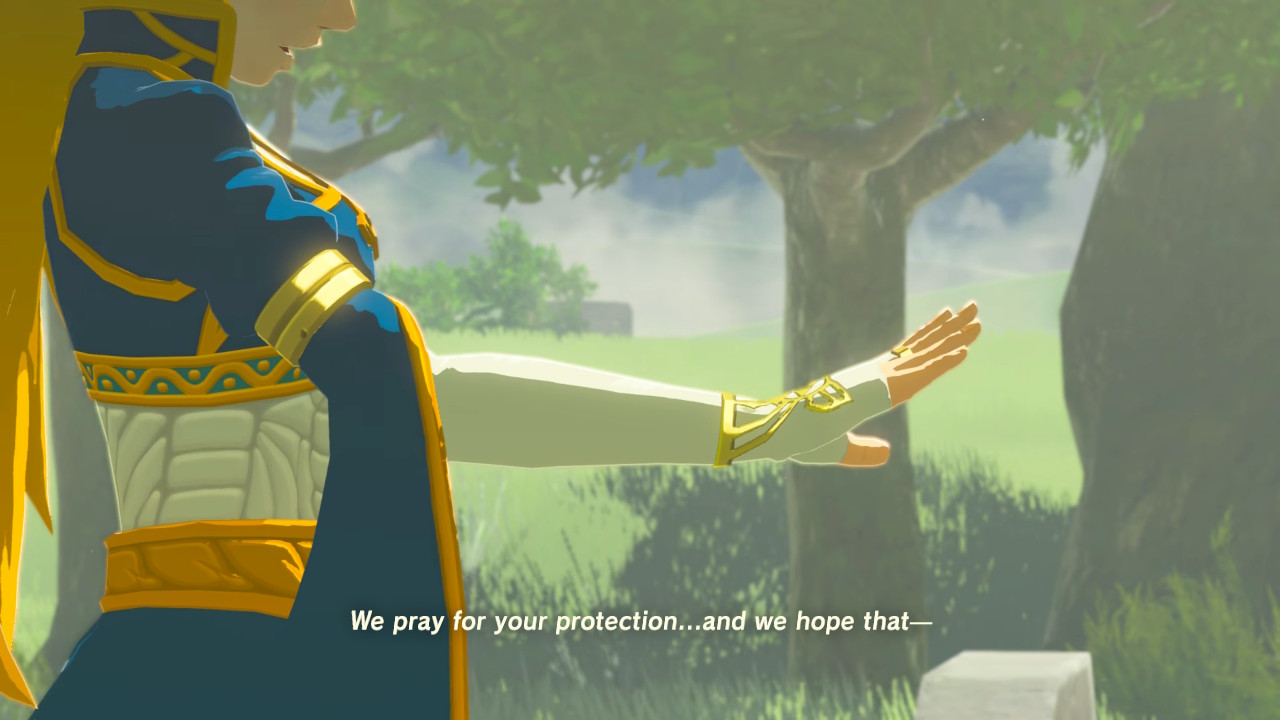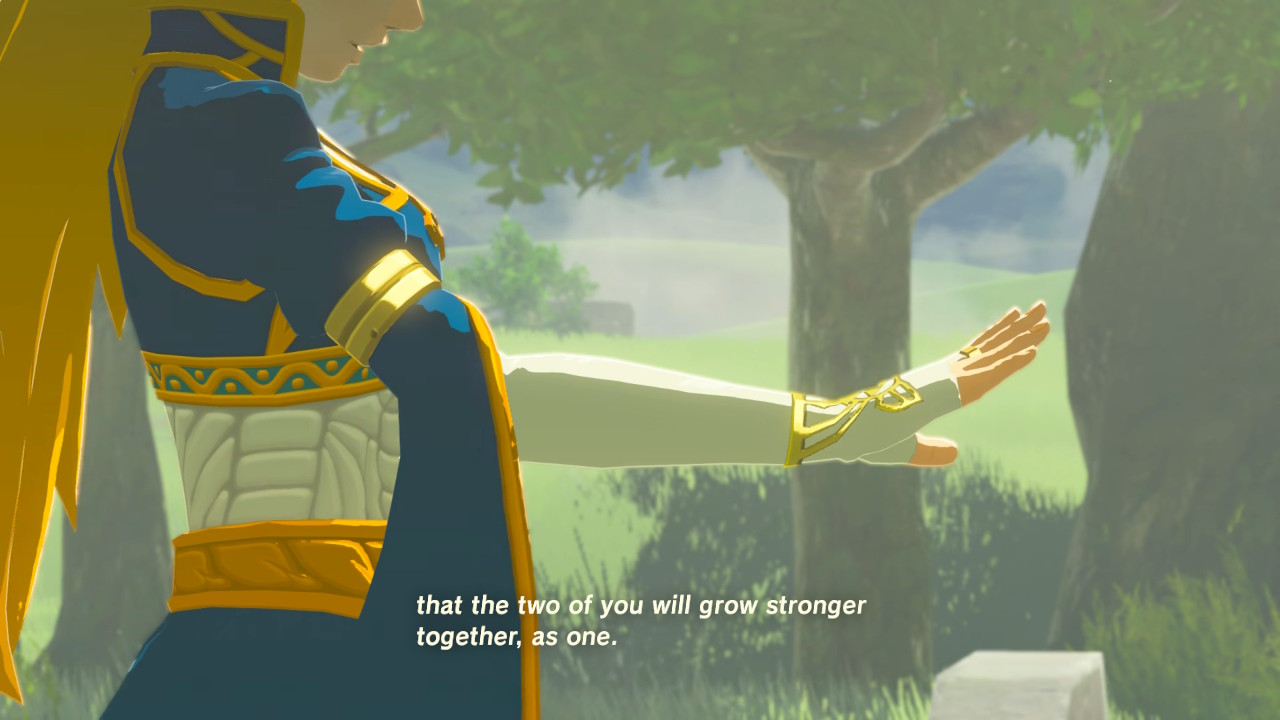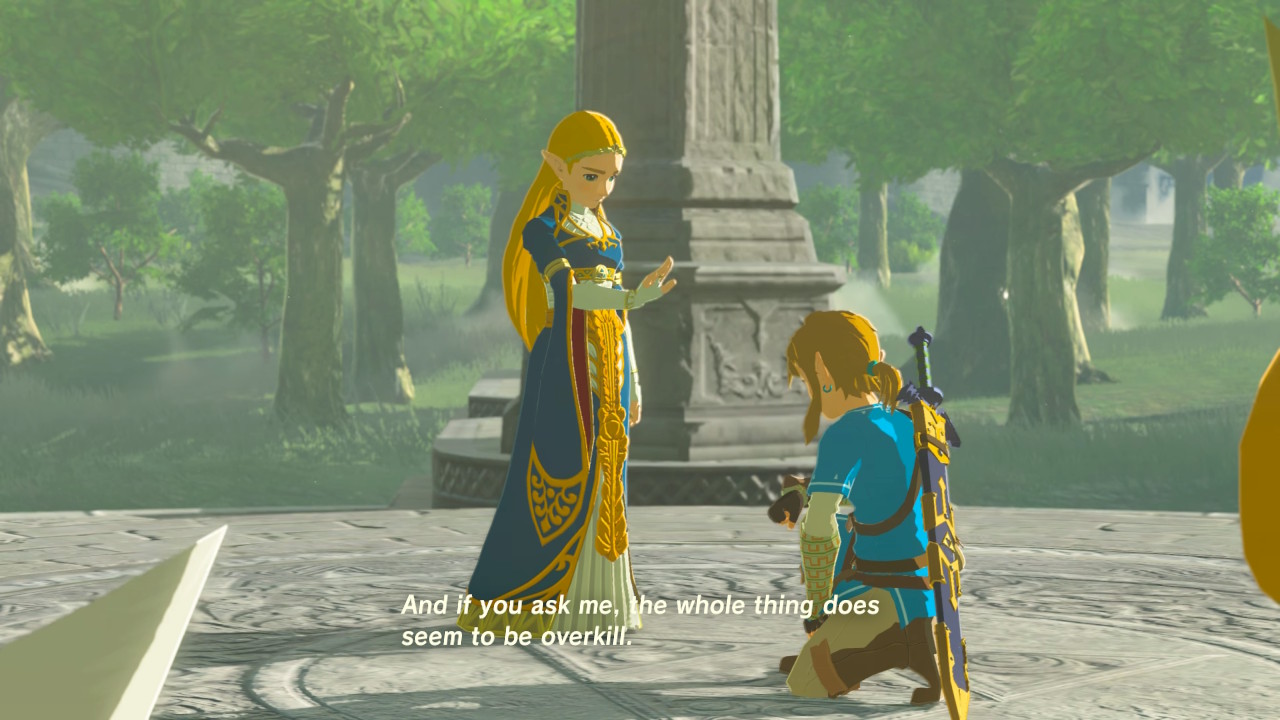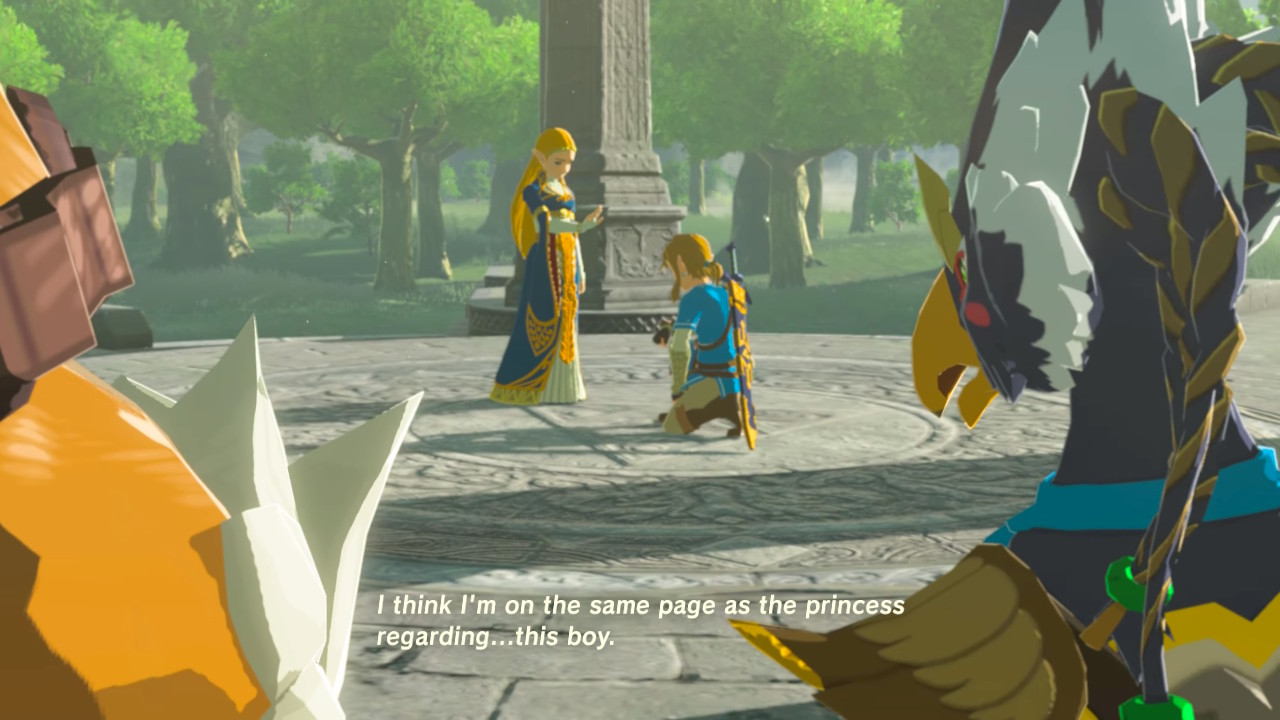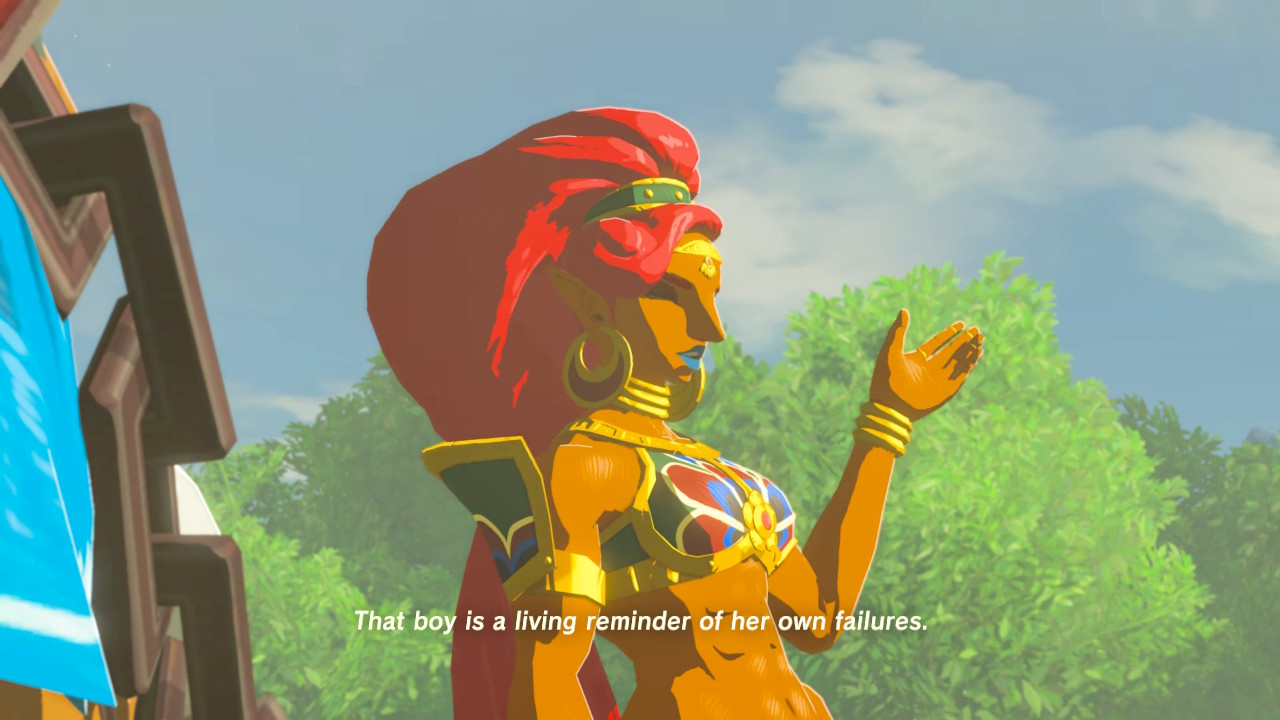Welcome to the Konnichiwa Korok project! This is dedicated to analyzing how professionals at Nintendo Treehouse went about localizing The Legend of Zelda: Breath of the Wild.
To achieve this goal, I’ve broken down the Japanese into a translation that is as direct as possible to the original Japanese. This is then compared to the localized version of the same text and provides us insight into Treehouse’s creative process.
Note: This is not a critical analysis, but an educational one.
This post is covering the first of 23 memories (including the five from The Champions’ Ballad DLC Pack): “Subdued Ceremony.” Take a look below!
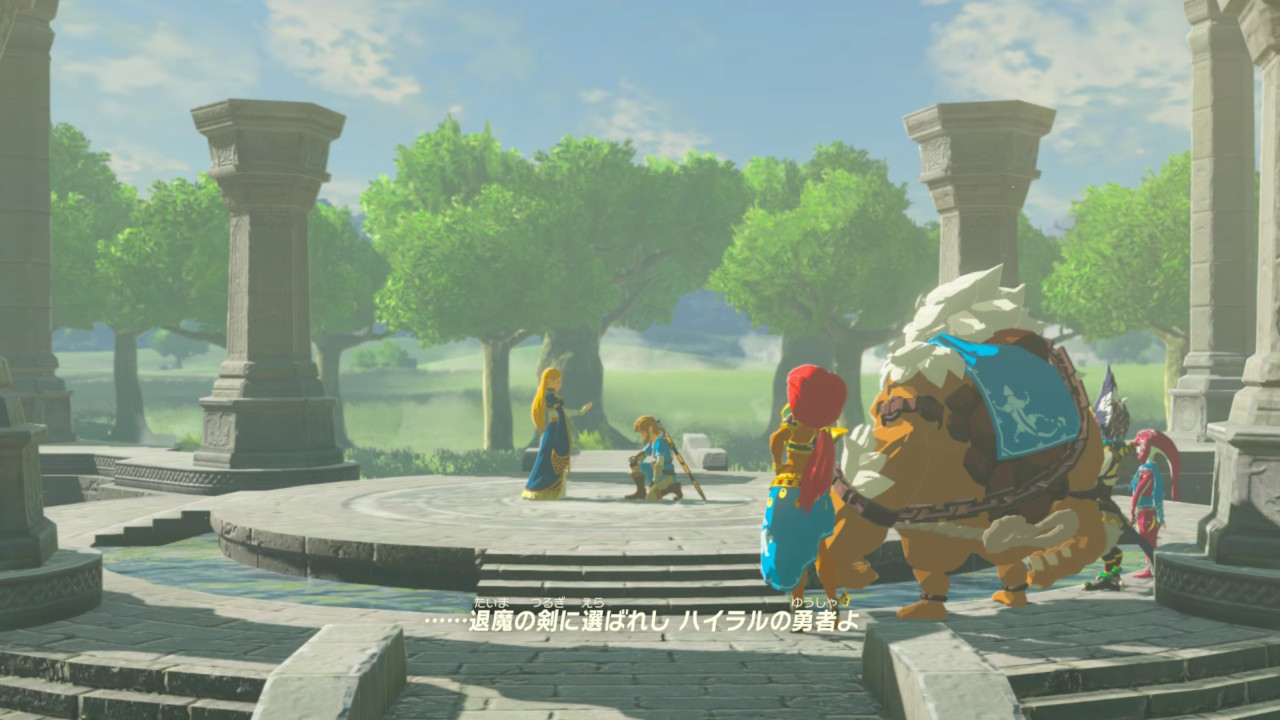
Zelda:
……退魔の剣に選ばれしハイラルの勇者よ
Kanji & Vocabulary:
- 退魔 (たいま | taima) = eradication of malignant spirits
- 剣 (つるぎ | tsurugi) = sword
- 選ばれる (えらばれる | erabareru ) = to be elected; to be chosen
- ハイラル (はいらる | hairaru) = Hyrule
- 勇者 (ゆうしゃ | yuusha) = hero
Notes:
- 選ばれし (erabareshi) is an archaism for 選ばれた (erabareta).
Translation:
Hyrule’s hero chosen by the sword which repels evil…
Localization:

Hero of Hyrule, chosen by the sword that seals the darkness…

そのたゆみぬ努力と結実せし剣技を認め……
Kanji & Vocabulary:
- たゆまぬ (tayumanu) = untiring; steady; persistent
- 努力 (どりょく | doryoku) = effort
- 結実 (けつじつ | ketsujitsu) = fruition; being successful
- 剣技 (けんぎ | kengi) = sword skill
- 認め (みとめ | mitome) = approval; acceptance; recognition
Notes:
- たゆまぬ is an archaic form of たゆまない (tayumanai).
- 結実せし (ketsujitsuseshi) is an archaic form of 結実した (ketsujitsushita). The 「し」is a declension of the Old Japanese auxiliary 「き」that indicates past tense).
Translation:
That untiring effort and skill with the sword are recognized…
Localization:
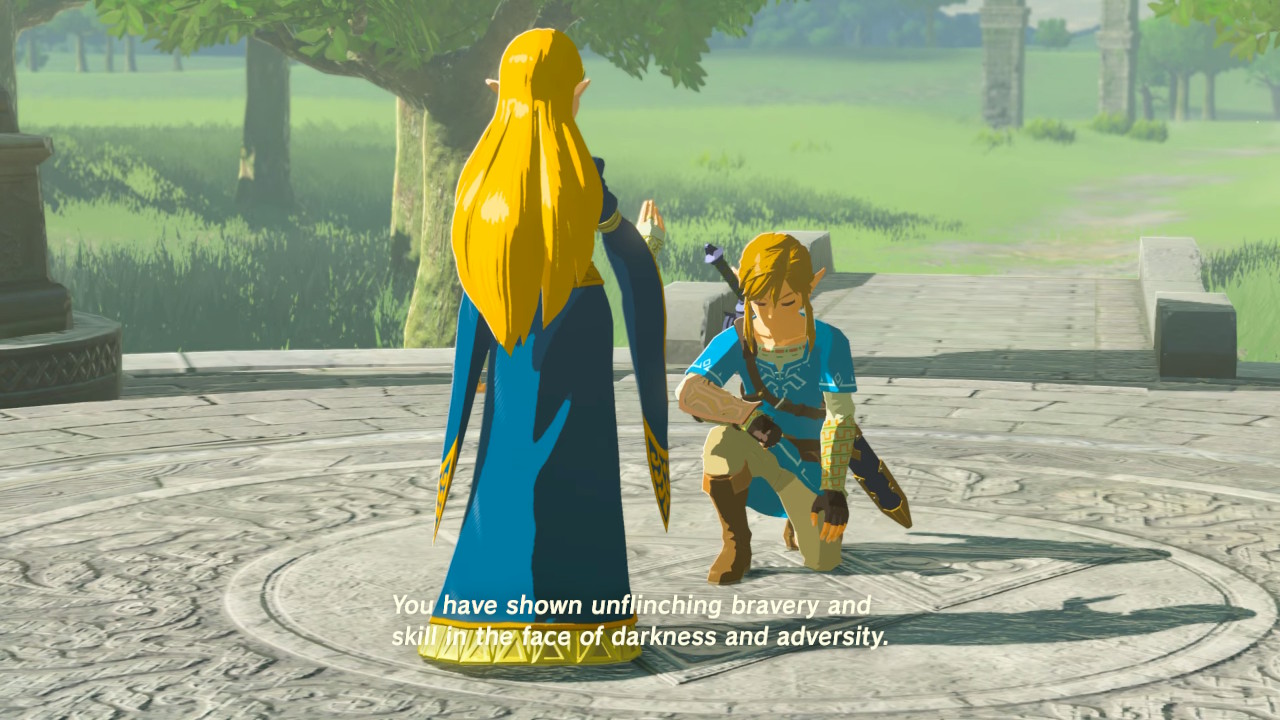
You have shown unflinching bravery and skill in the face of darkness and adversity.
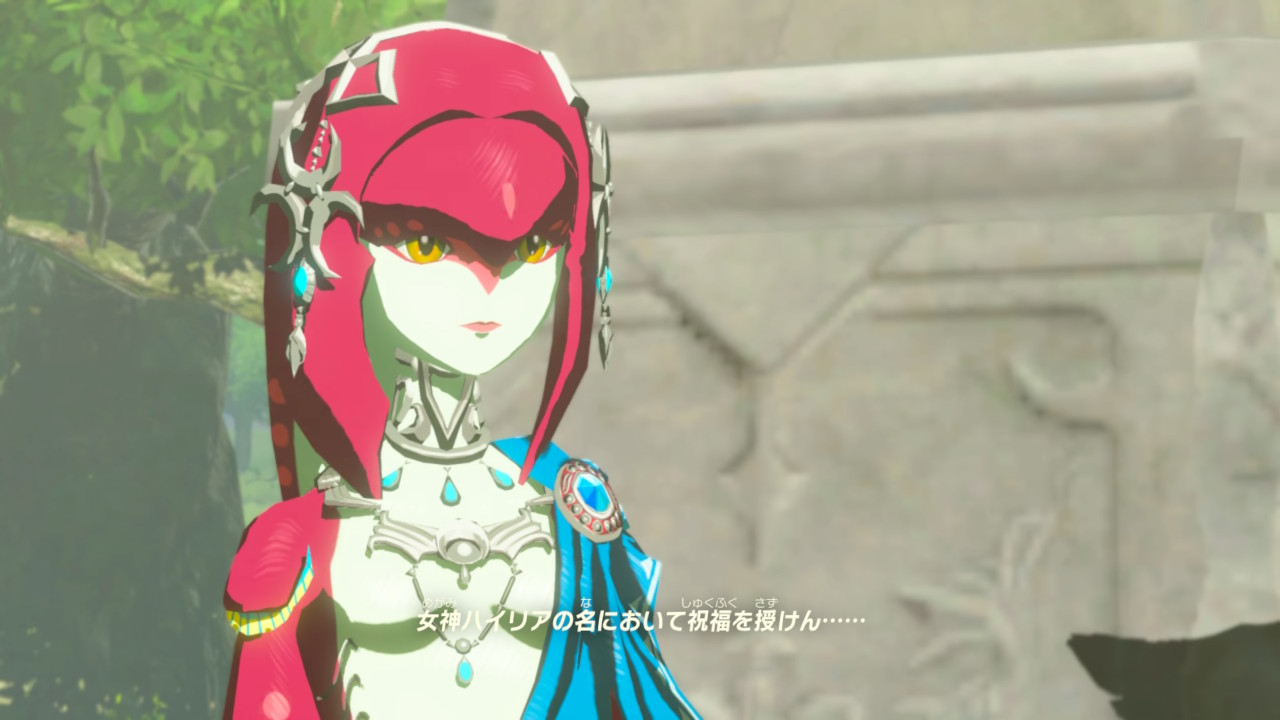
女神ハイリアの名において祝福を授けん……
Kanji & Vocabulary:
- 女神 (めがみ | megami) = goddess
- ハイリア (はいりあ | hairia) = Hylia
- 名 (な | na) = name
- 「〜において」 (〜nioite) = in; at; on
- 祝福 (しゅくふく| shukufuku) = blessing
- 授ける (さずける | sazukeru) = to grant; to award
Translation:
I grant you blessings in the name of the Goddess Hylia…
Localization:
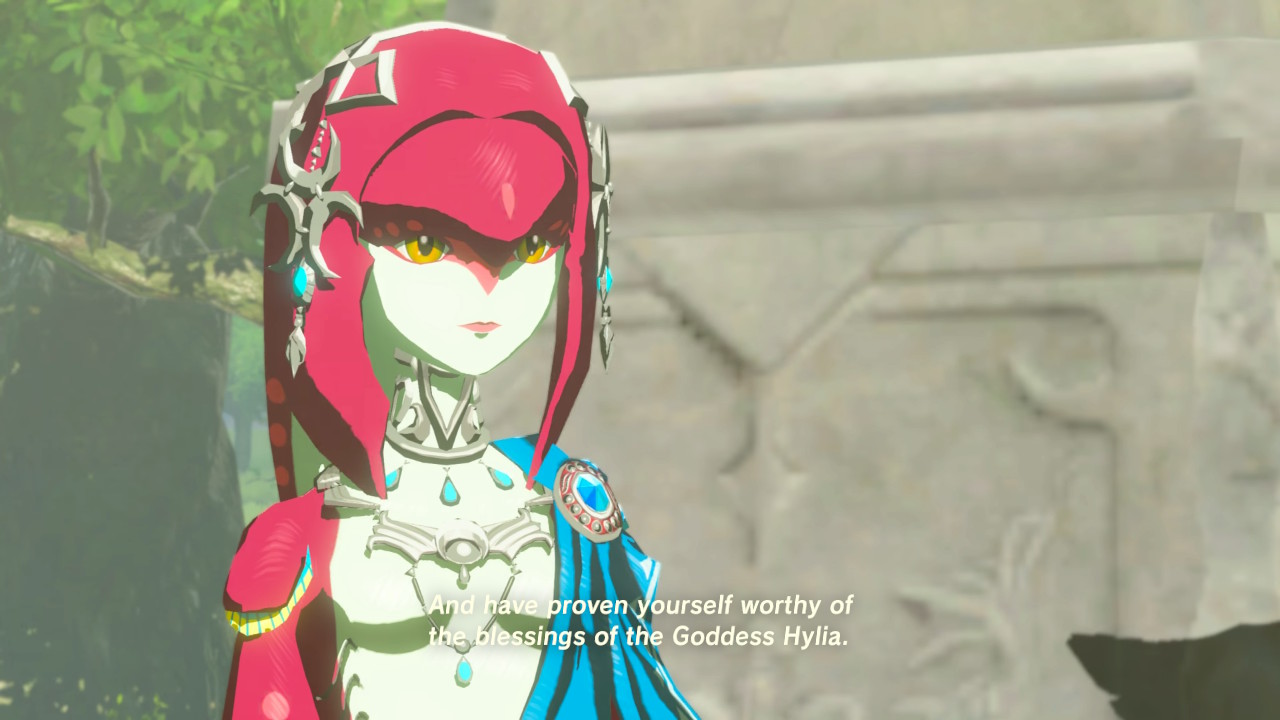
And have proven yourself worthy of the blessings of the Goddess Hylia.
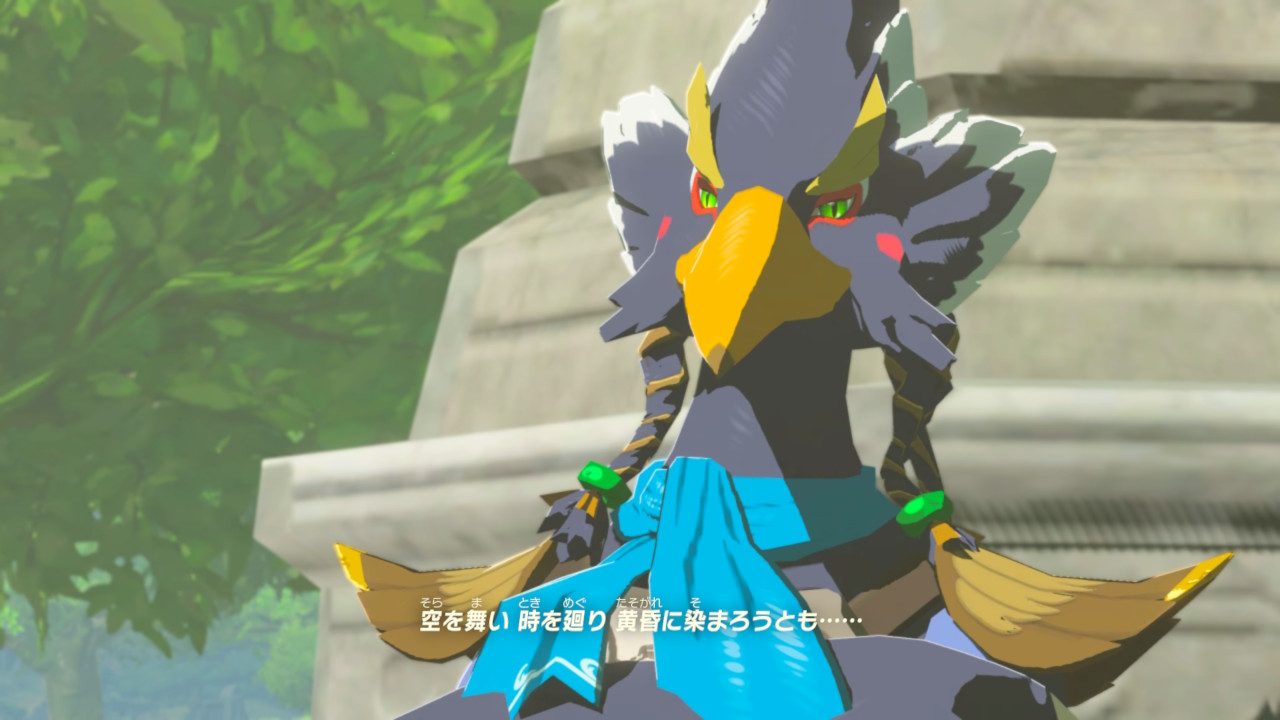
空を舞い 時を廻り 黄昏に染まろうとも……
Kanji & Vocabulary:
- 空 (そら | sora) = sky
- 舞い上げる (まい) = to soar
- 時 (とき | toki) = time
- 廻る (めぐる | meguru) = to go around; to return
- 黄昏 (たそがれ | tasogare) = twilight
- 染まる (そまる | somaru) = to be tainted; to be steeped; to be infected
Notes:
- 廻る is an alternate form of 巡り.
Translation:
To soar through the sky, return through time, or to be steeped in twilight…
Localization:
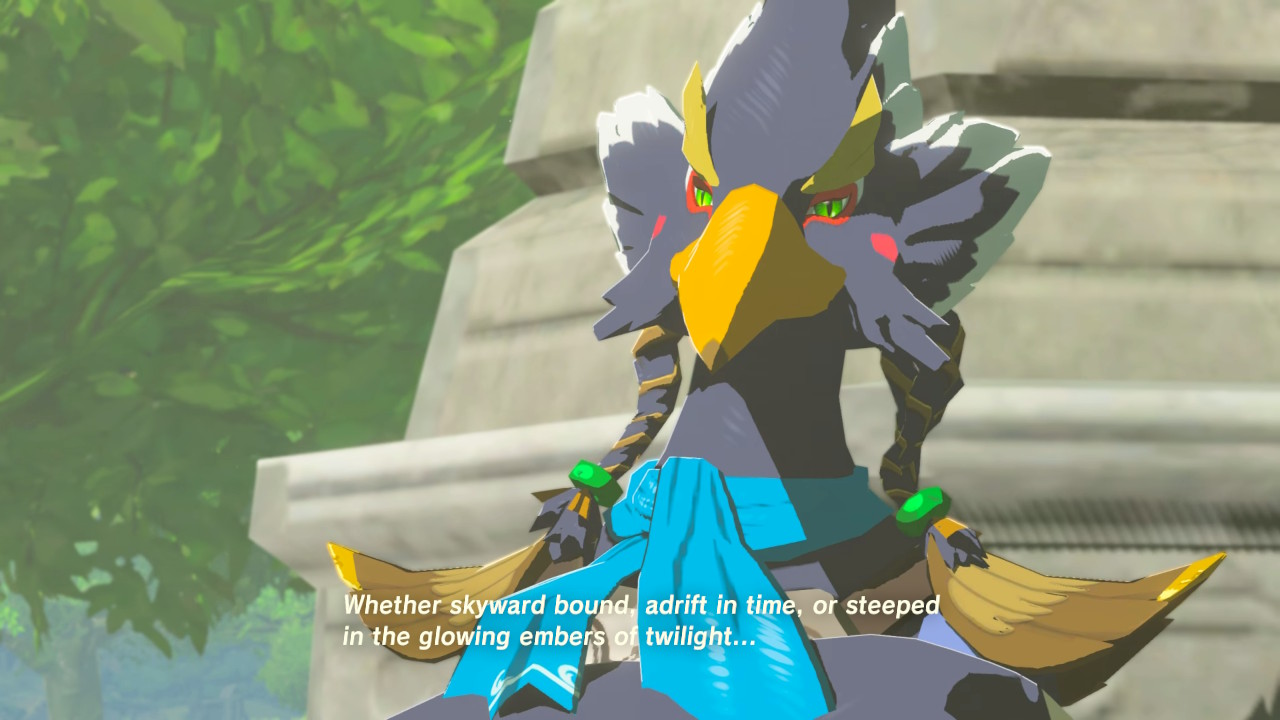
Whether skyward bound, adrift in time, or steeped in the glowing embers of twilight…
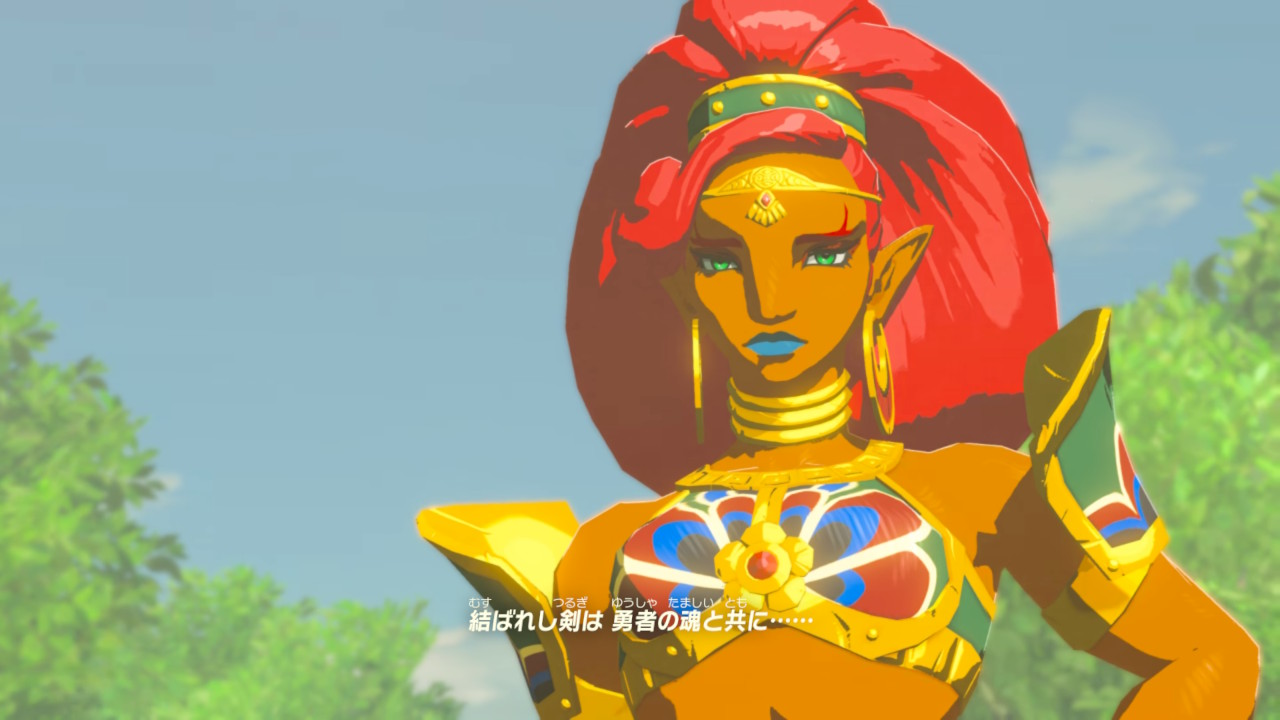
結ばれし剣は 勇者の魂と共に……
Kanji & Vocabulary:
- 結ばれる (むすばれる | musubareru) = to be tied together; to be wed
- 剣 (つるぎ | tsurugi) = sword
- 勇者 (ゆうしゃ | yuusha) = hero
- 魂 (たましい | tamashii) = soul; spirit
- 共に (ともに | tomoni) = both; together
Translation:
Bounded together is the soul of the hero and the sword…
Localization:
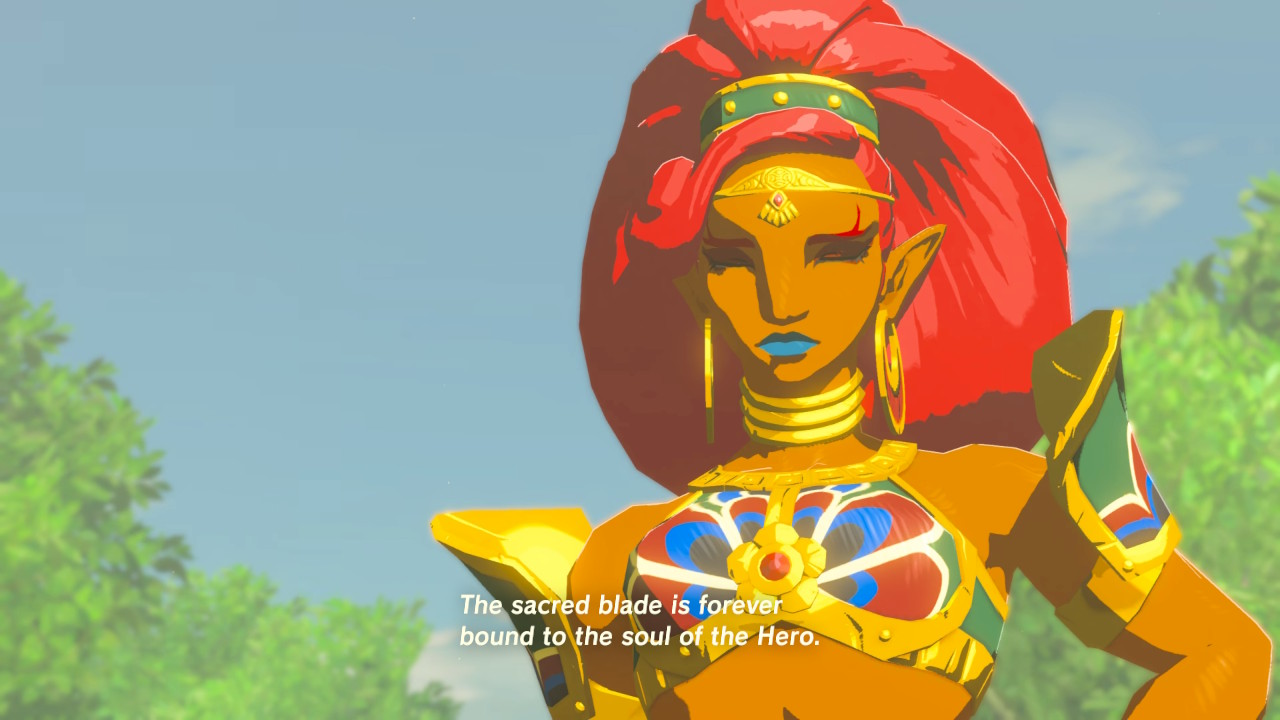
The sacred blade is forever bound to the soul of the Hero.
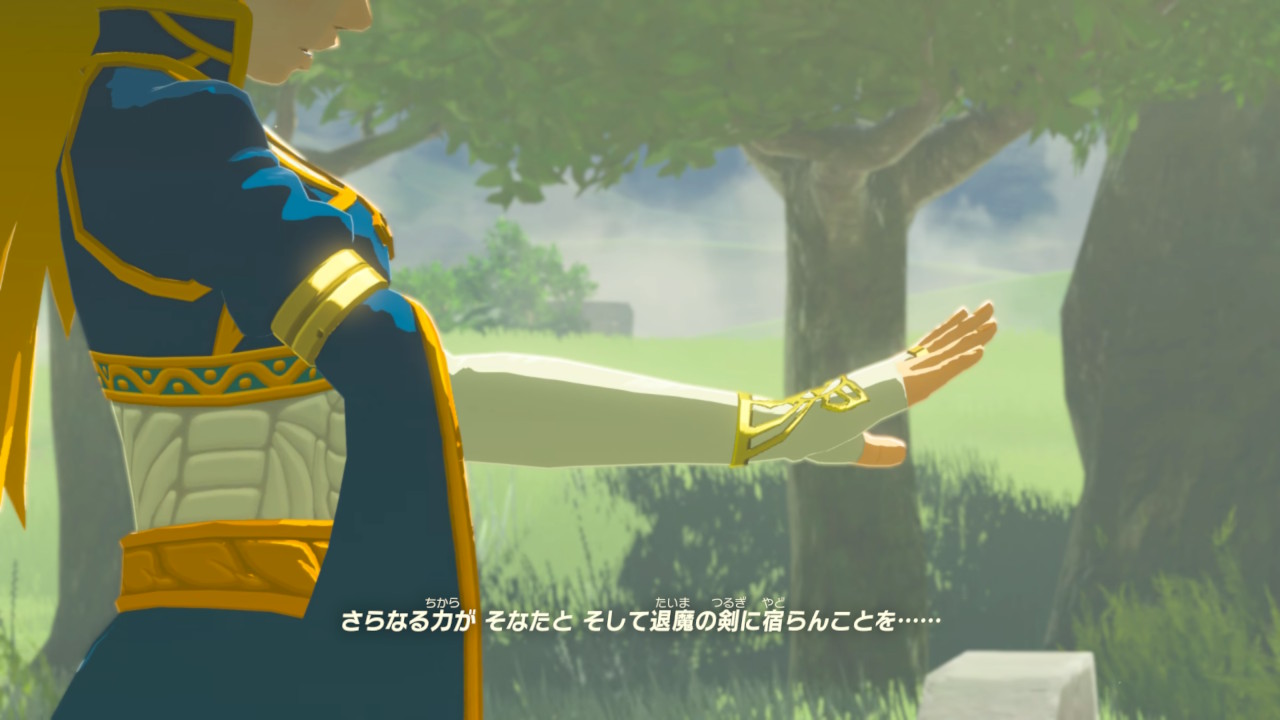
さらなる力が そなたと そして退魔の剣に宿らんことを……
Kanji & Vocabulary:
- さらなる (saranaru) = further; even more; still more
- 力 (ちから | chikara) = power; force; energy
- そなた (sonata) = that person (someone close to the listener)
- そして (soshite) = and
- 退魔 (たいま | taima) = eradication of malignant spirits
- 剣 (つるぎ | tsurugi) = sword
- 宿る (やどる | yadoru) = to live; to dwell
- こと (koto) = thing
Notes:
- 「~があらんことを」(ga aran koto o) is a grandiose phrase. Religious characters in manga and games say this all the time. “Xがあらんことを” is an archaic-sounding idiomatic phrase that means “I wish you X” or “May there be X”. It’s a fixed pattern used mainly by priests.
Translation:
Furthermore, I wish for [this] power to remain within this person and the sword which repels evil…
Localization:
We pray for your protection…and we hope that—that the two of you will grow stronger together, as one.
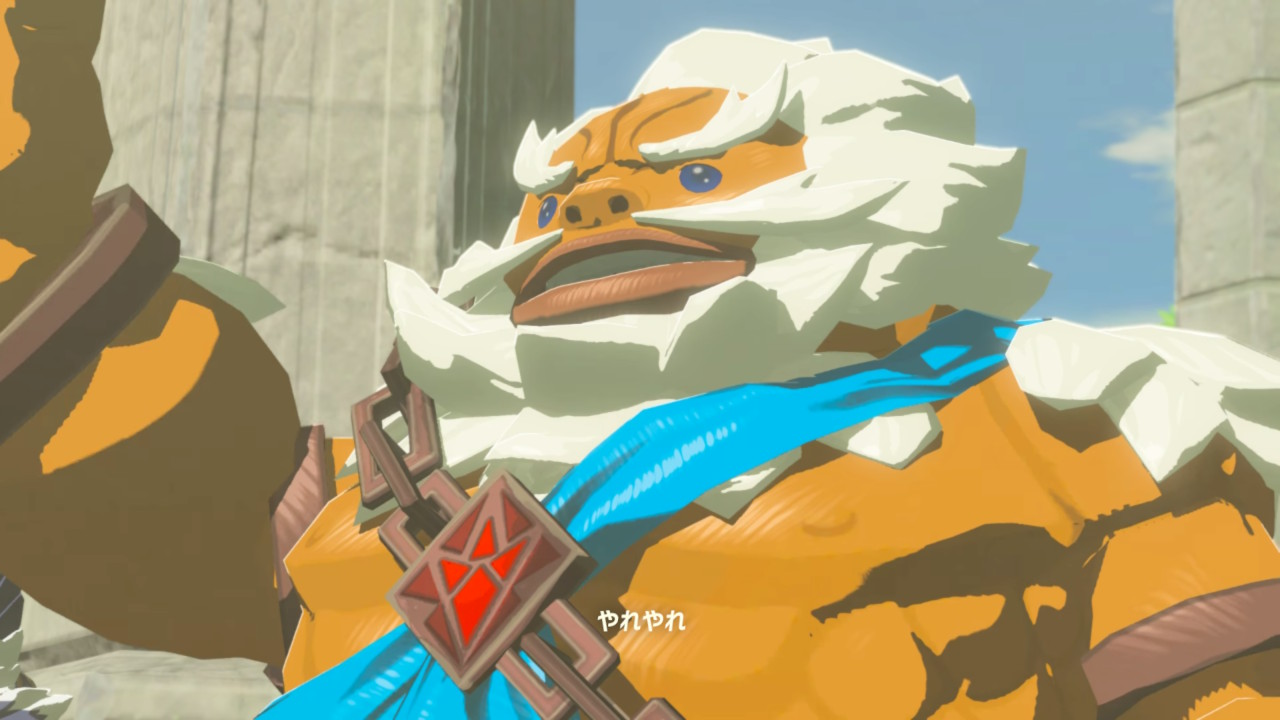
Daruk:
やれやれ
Kanji & Vocabulary:
- やれやれ (yareyare) = Good grief!/Oh dear…
Translation:
Oh dear…
Localization:
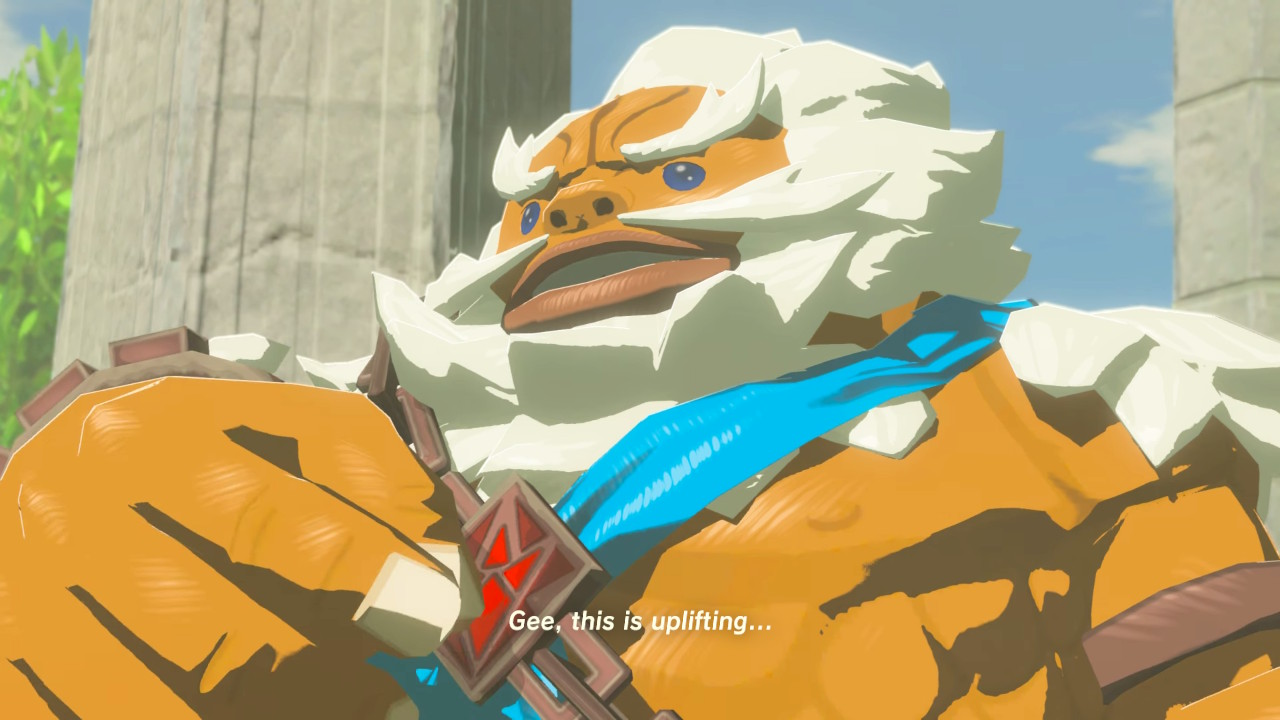
Gee, this is uplifting…
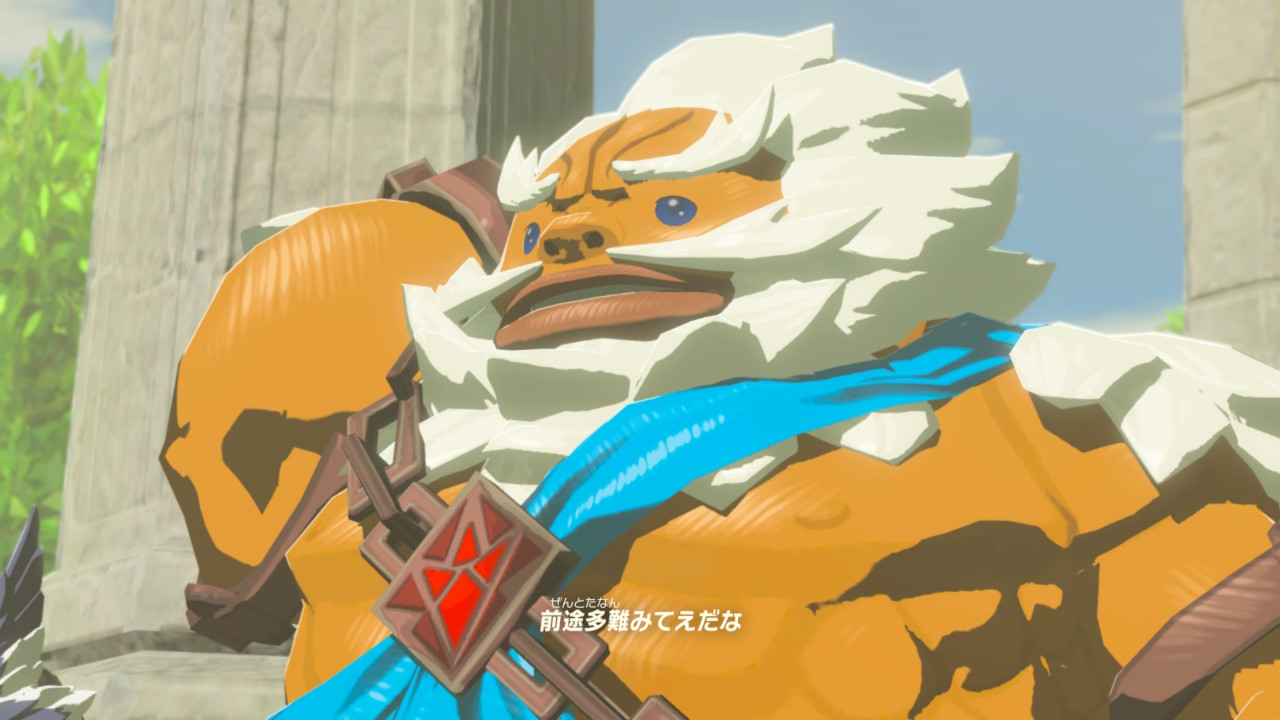
前途多難みてえだな
Kanji & Vocabulary:
- 前途多難 (ぜんとたなん | zentotanan) = grim prospects
- みてえ(mitee) = looks like
Notes:
- みてえ is male slang for みたい (mitai).
- な (na) is often used by men, and usually within the same age group. It’s used similarly to ね (ne), with a rising intonation, but the sound comes off as a bit rougher. It’s also used much more in casual situations than ね, which is more acceptable in a work environment. Basically, な is a way of expressing an opinion or feeling without asserting yourself too much. However, it can also be used to confirm information.
Translation:
[Zelda makes] it seem like our future is grim.
Localization:

She’s making it sound like we already lost.
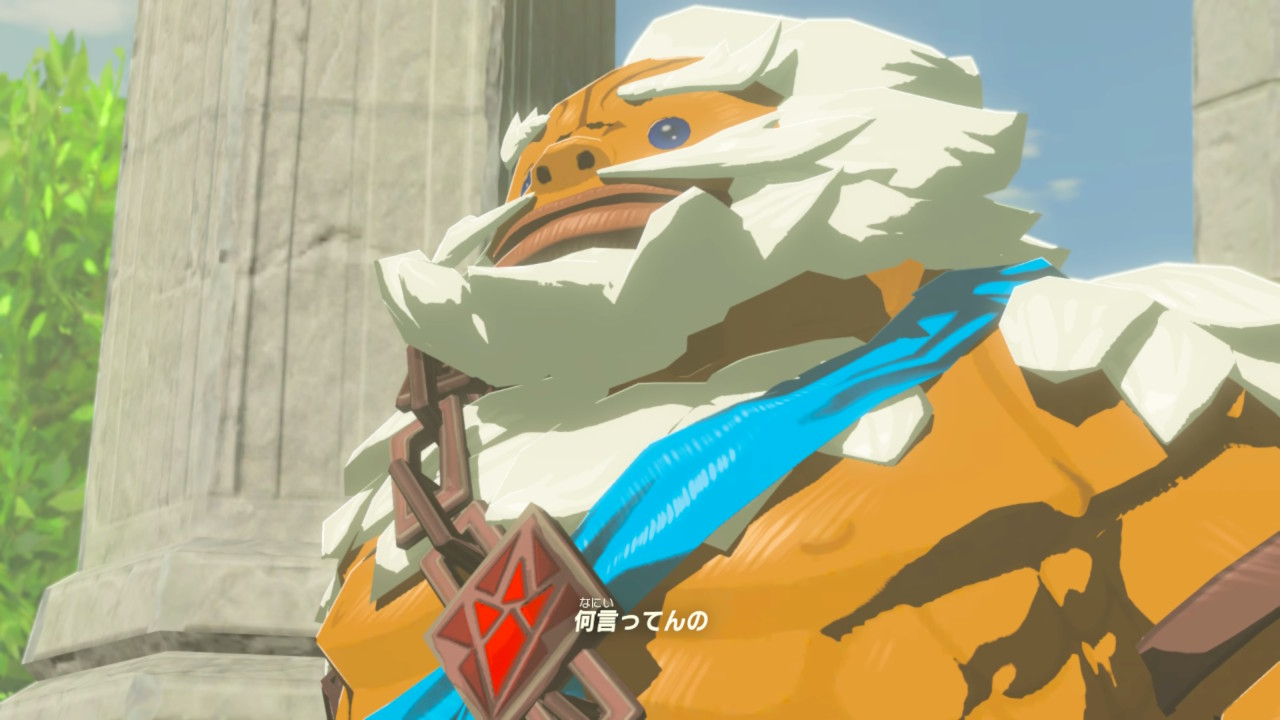
Revali:
何言ってんの
Kanji & Vocabulary:
- 何 (なに | nani) = what
- 言う (いう | iu) = to say
Translation:
What are you talking about?
Localization:

Wasn’t this your idea?
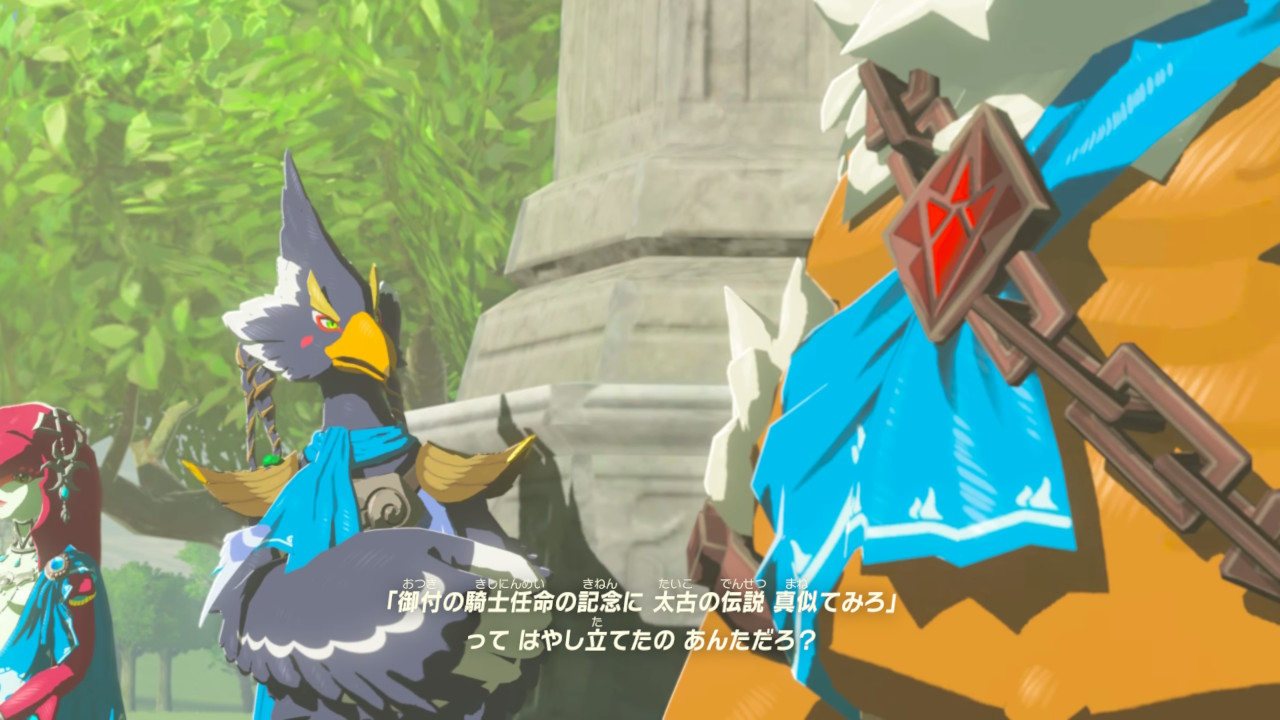
「御付の騎士任命の記念に 太古の伝説 真似てみろ」って はやし立てたの あんただろ?
Kanji & Vocabulary:
- 御付 (おつけ | otsuke) = retainer; attendant; escort
- 騎士 (きし | kishi) = knight
- 任命 (にんめい | ninmei)= nomination; appointment
- 記念 (きねん | kinen) = commemoration; celebration
- 太古 (たいこ | taiko) = ancient times
- 伝説 (でんせつ | densetsu) = legend
- 真似 (まね | mane) = imitating/copying
- はやし立てる (はやしたてる | hayashitateru)= to cheer; to hype up
- あんた (anta) = you
Notes:
- てみろ is the imperative form (rough/vulgar/male speech) of 〜てみる. This form is used when you tell people what to do strongly or when you challenge people to do something.
- あんた is another form of あなた (anata), which means “you.” However, あんた implies looking down on someone.
Translation:
Weren’t YOU the one who pushed the idea to “imitate the ancient legend to celebrate his assignment as [Zelda’s] knight escort?”
Localization:
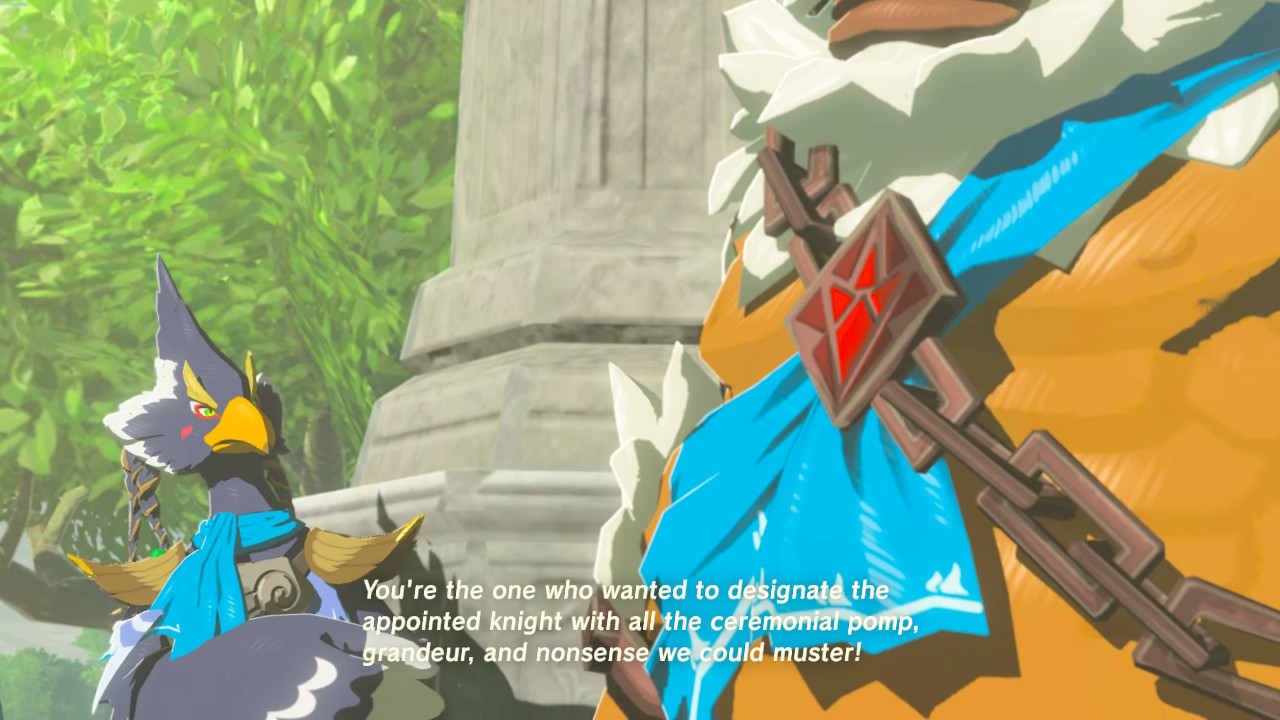
You’re the one who wanted to designate the appointed knight with all the ceremonial pomp, grandeur, and nonsense we could muster!
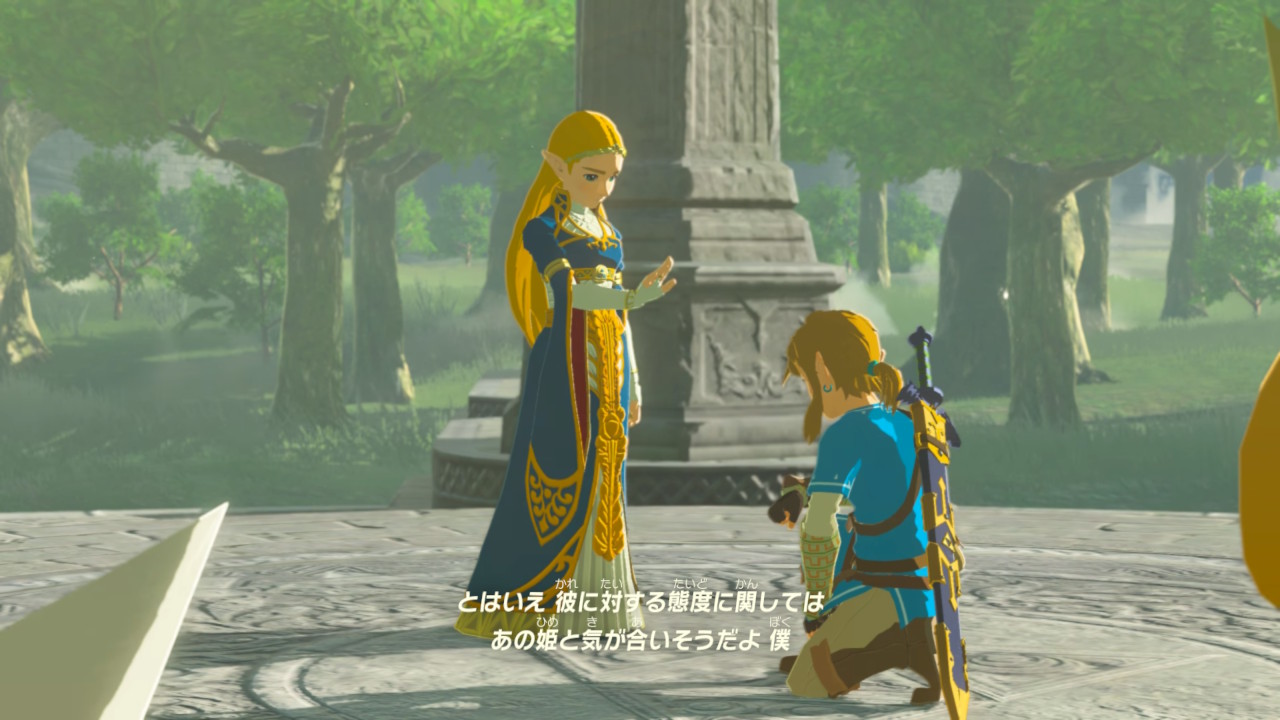
とはいえ 彼に対する態度に関しては あの姫と気が合いそうだよ 僕
Kanji & Vocabulary:
- とはいえ (tohaie) = although; be as it may; though; nonetheless
- 彼 (かれ | kare) = he/him
- 対する (たいする | taisuru) = to face; to confront; to oppose
- 態度 (たいど | taido) = attitude; behavior
- 関して (かんして | kanshite)= in relation to (regarding)
- あの (ano) = that
- 姫 (ひめ | hime) = princess
- 気が合い (きがあい | kigaai) = mood; feelings + together (mutual consent)
- 僕 (ぼく | boku) = I
Translation:
Nonetheless, I feel the same as the princess regarding her [hostile] attitude about him.
Localization:
And if you ask me, the whole things does seem a bit overkill. I think I’m on the same page as the princess regarding…this boy.

Urbosa:
しょうがないよ
御ひい様にとっちゃ あいつの存在は……
Kanji & Vocabulary:
- しょうがない (shouganai) = It can’t be helped./There’s nothing that can be done.
- 御ひい様 (おひいさま | ohiisama) = princess
- 「〜にとっちゃ」 (〜nitoccha) = concerning; regarding
- あいつ (aitsu) = he; she; that guy
- 存在 (そんざい | sonzai) = existence
Notes:
- 「〜にとっちゃ」 is a colloquial way of saying 「〜にとっては」.
Translation:
It can’t be helped. For the princess, his existence seems…
Oh, give it a rest. That boy is a living reminder of her own failures.

そう コンプレックスの象徴みたいなもんだから
Kanji & Vocabulary:
- コンプレックス (こんぷれっくす | konpurekksu) = complex (short for inferiority complex)
- 象徴 (しょうちょう | shouchou) = symbol
- みたい (mitai) = looks like
Notes:
- もんだから (mondakara) is used in situations where you’re giving a reason why something couldn’t be helped, usually something negative.
Translation:
…symbolic of her [inferiority] complex.
Localization:
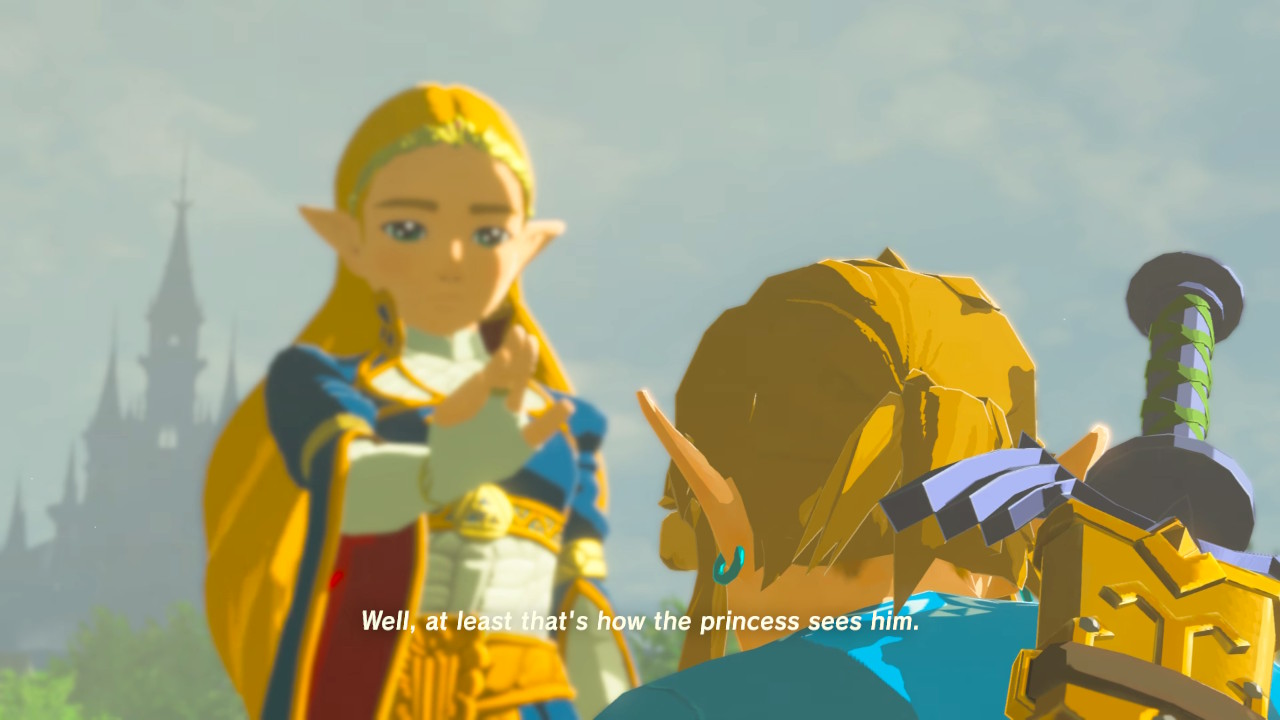
Well, at least that’s how the princess sees him.
I hope you found that informative and interesting! Feel free to share with anyone who might enjoy this. Sometimes I stream myself doing these translations on Twitch. Please look forward to the next post covering Memory #2: Revali’s Flap!
